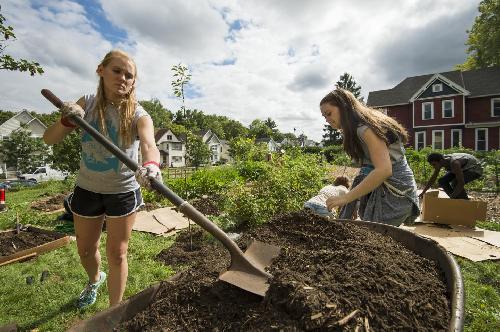Research from the University of Rochester finds that caring for others dips during adolescence. But when young people feel supported from their social circles, their concern for others rebound.
"Young people often perceive relationships they have as being less supportive during middle and early high school years," said Laura Wray-Lake, an assistant professor in psychology at the University of Rochester. "Our study showed that youth perceptions of supports from parents, school, friends, and the community decreased across adolescence. Social responsibility--values that support caring for the welfare of others--declined in concert with these decreases in support."
There's an instructive take-away. "Relationships with parents, schools, and peers do get more complex during adolescence, and some young people may start to feel less bonded to those around them," Wray-Lake said. "But, if a student has support from their parents and their school, and they also have supportive friends, those relationships are going to give them a boost in terms of prosocial engagement."

Wray-Lake and her colleagues also looked at students' individual behaviors and found that over time, volunteering resulted in an increase in values of caring. The actual experience of being civically engaged appears to enhance social responsibility values, the researchers said.
The opposite is true, however, for substance use. An increase in substance use is related to lower social responsibility over time. According to the study, which was published in Developmental Psychology, young people who get involved with risky behavior might have values that are more hedonistic--living in the moment and having fun--which can conflict with social values that lead to helping and caring for other people.
Wray-Lake and her team conducted the longitudinal study with over 3,500 American adolescents from rural, suburban, and urban communities. Participants were asked to rate their beliefs using a 5-point scale ranging from strongly disagree to strongly agree. They were presented with a series of questions with the stem, "It's very important to me," including:
- to help those who are less fortunate.
- to help people in my community.
- to me to serve my country.
- to me to help my society.
- to me to help other students in school.
The study showed values of social responsibility decrease between the ages 10 to 16 before leveling off in later adolescence. Race and socioeconomic status had no effect on students' social responsibility.
The participants also reported on their relationships with parents, school, peers, and the larger community. Each of these social networks was significantly and uniquely associated with the students' social responsibility.
"What was really striking to me was that we were able to predict change in social responsibility over time," Wray-Lake said. "Increases in young people's perceptions of positive relationships related to increases in social responsibility. It's also true that decreases in positive relationships resulted in declines in social responsibility."




Comments